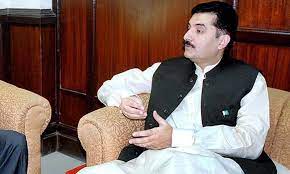Covid has impacted millions: Faisal Karim Kundi

Islamabad: Prime Minister’s Special Assistant on Poverty Alleviation & Social Safety Mr. Faisal Karim Kundi has said that “the COVID-19 pandemic” has taken lives and overwhelmed health systems and economies at an unprecedented pace and scale. It has negatively impacted millions of individuals and has disproportionately affected the poor at a large scale. He said this while addressing the COMCEC 38thsession on “Pakistan’s Effective Social Assistance Provision and Socioeconomic Empowerment in the light of COVID-19 Pandemic”.
SAPM highlighted that Government of Pakistan allocated ~USD 1.23 billion to deliver one-time emergency cash to 16.9 million families, which came to over 109 million people, including minorities and transgender citizens. Through Benazir Income Support Program’s Emergency Cash disbursement, each family received USD 75, for immediate subsistence needs, he added.
Faisal Karim Kundi informed the participants that by utilizing BISP’s NSER data, a hybrid targeting approach was adopted, combining emergency assistance for the known vulnerable with demand-based support for the “new poor”. He said that The Millennium Development Goals (MDG) on poverty eradication was achieved five years ahead of schedule.
SAPM further said that Pakistan has faced death and destruction because of the recent floods, which has devastated the lives and infrastructure of around 33 million people in the country. Emergency aid of USD 312 million was distributed to 2.7 million families through a targeted mechanism under the Benazir Income Support Programme. Each family received USD 112 as part of this emergency disbursement, he added.
Faisal Kundi said that to address the challenges caused by malnutrition among vulnerable population, the existing BISP Nutrition (Nashonuma) Programme was expanded, and a Blanket Supplementary Food Programme was initiated in flood-affected regions to provide Specialized Nutritious Food (SNF) to over 12000 Pregnant and Lactating mothers and 11,200 children under the age of two. He said that it is a global responsibility to help vulnerable communities to fight the devastating impact of climate change so that they remain prepared for the future events.





